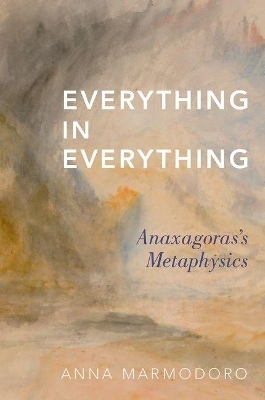
Everything in Everything
Oxford University Press Inc (Verlag)
978-0-19-061197-2 (ISBN)
Anaxagoras of Clazomenae (Vth century BCE) is best known in the history of philosophy for his stance that there is a share of everything in everything. He puts forward this theory of extreme mixture as a solution to the problem of change that he and his contemporaries inherited from Parmenides - that what is cannot come from what is not (and vice versa). Yet, for ancient and modern scholars alike, the metaphysical significance of Anaxagoras's position has proven challenging to understand. In Everything in Everything, Anna Marmodoro offers a fresh interpretation of Anaxagoras's theory of mixture, arguing for its soundness and also relevance to contemporary debates in metaphysics. For Anaxagoras the fundamental elements of reality are the opposites (hot, cold, wet, dry, etc.), which Marmodoro argues are instances of physical causal powers. The unchanging opposites compose mereologically, forming (phenomenologically) emergent wholes. Everything in the universe (except nous) derives from the opposites. Marmodoro shows that this is made possible in Anaxagoras system by the omni-presence and hence com-presence of the opposites in the universe, which is in turn facilitated by the fact that for Anaxagoras the opposites exist as unlimitedly divided. She argues that Anaxagoras is the first ante litteram 'gunk lover' in the history of metaphysics. He also has a unique conception of (non-material) gunk and a unique power ontology, which Marmodoro refers to as 'power gunk'. Marmodoro investigates the nature of power gunk and the explanatory utility of the concept for Anaxagoras, for his theory of extreme mixture; and finally contrasts it with the only other metaphysical system in antiquity positing (material) gunk, that of the Stoics.
Anna Marmodoro is an Official Fellow in Philosophy at Corpus Christi College, University of Oxford. She specializes in ancient philosophy and contemporary metaphysics. She has published books and journal articles in both areas; and currently directs two major research projects: one on ancient and contemporary metaphysics of powers funded by the European Research Council, and one on the metaphysics of quantum entanglement, funded by the Templeton World Charity Foundation.
Acknowledgments
Introduction
Chapter I: The fundamental items in the ontology
1.1. Opposites, stuffs and seeds
1.2. Does matter 'matter' to Anaxagoras?
1.3. The concreteness of power
1.4. Parmenidean constraints on change
1.5. The causal efficacy of the opposites
1.6. An early power ontology?
Closing remarks
Appendix 1. Anaxagorean versus Aristotelian powers
Chapter II: The principles governing the ontology
2.1. The Principle of Universal Extraction
2.2. The Everything in Everything Principle
2.3. The No Least and No Largest Principles
2.4. The Preponderance Principle
2.5. The outcome of preponderance
Closing remarks
Chapter III: A theory of extreme mixture
3.1. The inseparability of all opposites
3.2. Power gunk
3.3. Divided gunk
3.4. Gunk's location in space
3.5. The Grind model
3.6. Can there be preponderance in a gunky world?
Closing remarks
Appendix 2: An overview of Anaxagoras's main metaphysical principles
Chapter IV: Compresence versus containment of the opposites
4.1. The Proportionate interpretation
4.2. The Particulate interpretation
4.3. The Liquids model
4.4. The No-divisibility interpretation
Closing remarks
Appendix 3: Zeno's Argument from Multitude
Chapter V: Intelligent powers
5.1. The unmixed status of nous
5.2. The structure and operation of nous
5.3. Nous' cosmic powers
5.4. Nous' cognitive powers
5.5. The seeds and the origins of life
Closing remarks
Chapter VI: Stoic gunk
6.1. Unlimited division
6.2. Colocation
6.3. The constitution of material objects; what is active and what is passive
6.4. Sharing subjects
6.5. Causation
6.6. Types of ontological unity
Closing remarks
Conclusions
Bibliography
| Erscheinungsdatum | 20.03.2017 |
|---|---|
| Verlagsort | New York |
| Sprache | englisch |
| Maße | 137 x 211 mm |
| Gewicht | 363 g |
| Themenwelt | Geisteswissenschaften ► Philosophie ► Metaphysik / Ontologie |
| Geisteswissenschaften ► Philosophie ► Philosophie Altertum / Antike | |
| ISBN-10 | 0-19-061197-9 / 0190611979 |
| ISBN-13 | 978-0-19-061197-2 / 9780190611972 |
| Zustand | Neuware |
| Informationen gemäß Produktsicherheitsverordnung (GPSR) | |
| Haben Sie eine Frage zum Produkt? |
aus dem Bereich


